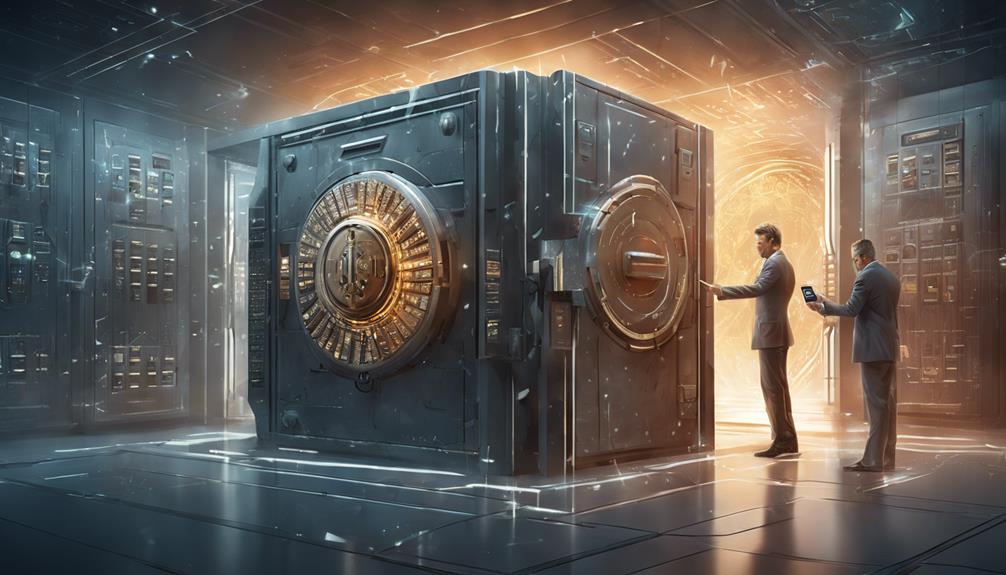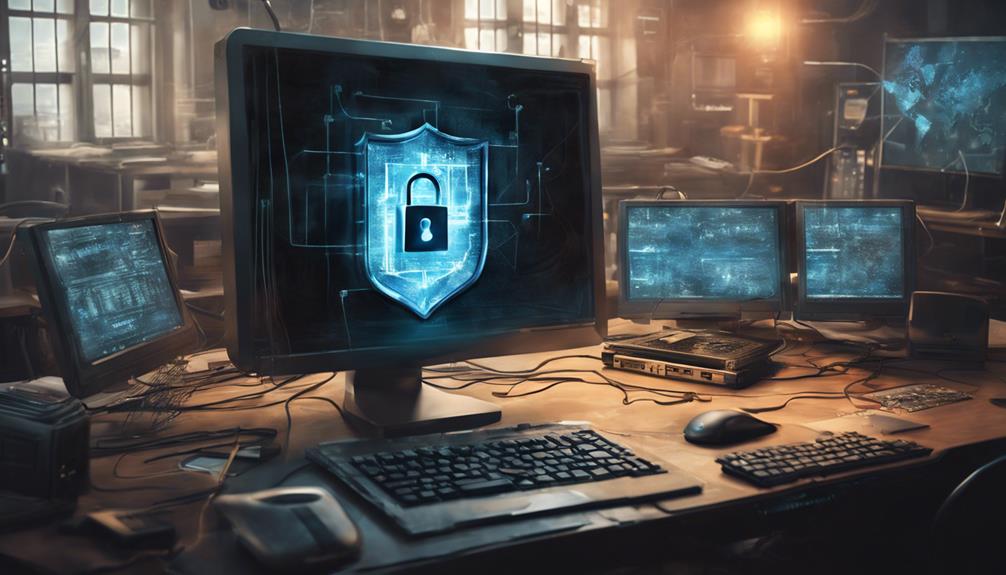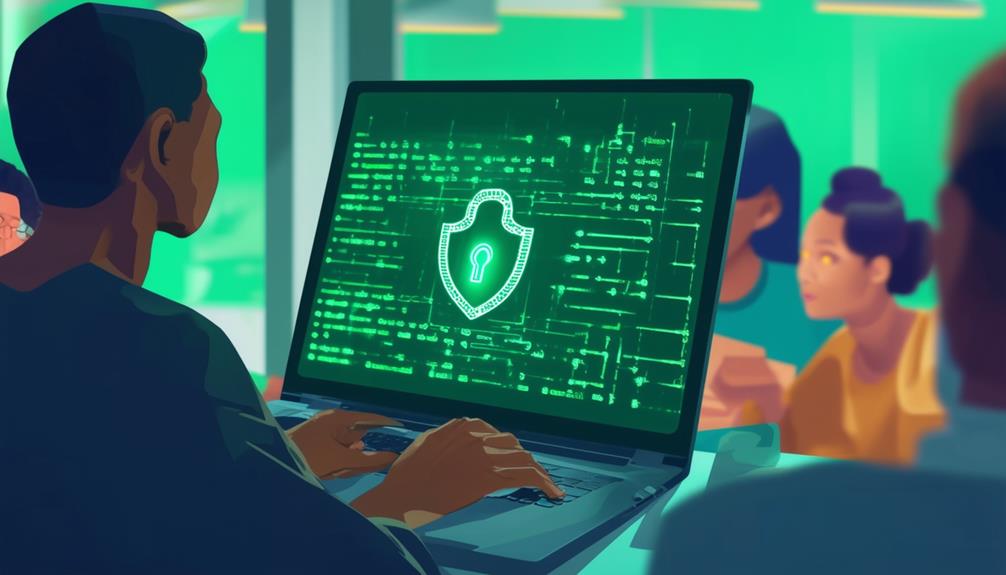Your money in the bank is secure from hackers due to robust security measures like strong passwords, encryption, firewall protection, and multi-factor authentication. Financial institutions invest in advanced technologies to combat cyber threats and prevent unauthorized access. Regular security updates enhance protection, reducing phishing risks and safeguarding your financial data. By staying vigilant, monitoring accounts, and utilizing security features, you can detect potential hacks early and report any suspicious transactions promptly. Implementing best practices, such as unique passwords and two-factor authentication, further enhance the safety of your funds. Banks prioritize security to keep your money safe from cyberattacks.
Key Takeaways
- Strong passwords and two-factor authentication protect against unauthorized access.
- Encryption, firewalls, and regular security updates safeguard financial data.
- Staying vigilant, monitoring accounts, and reporting unauthorized transactions enhance security.
- Implementing best practices for online security reduces the risk of hacking.
- Utilizing secure online banking features and two-factor authentication keeps money safe from hackers.
Bank Security Measures
When evaluating the safety of your money in the bank from hackers, understanding the robust security measures implemented by financial institutions is vital. Banks prioritize protecting customer accounts through a combination of bank security measures, such as strong passwords, two-factor authentication, and online banking security protocols.
Strong passwords act as an initial line of defense, requiring a combination of letters, numbers, and special characters to deter unauthorized access. Two-factor authentication adds an extra layer of security by verifying your identity through a secondary method, like a text message code or fingerprint scan. Online banking security features like automatic sign-out help prevent unauthorized access to your account if you forget to log out.
These measures work collectively to protect your bank account from cyber threats and safeguard the safety of your funds in an increasingly digital world where online crimes are prevalent. It is essential to prioritize the implementation of these security measures to safeguard your financial assets effectively.
Encryption and Firewall Protection

Utilizing robust encryption and firewall protection is essential for safeguarding customer data and transactions in online banking platforms against potential cyber threats. Encryption plays a vital role in online banking security by scrambling sensitive information, making it unreadable to unauthorized parties.
Simultaneously, firewalls act as a protective barrier, filtering network traffic to block malicious cyber-attacks. These security measures are paramount in ensuring that customer data remains secure and confidential during online transactions.
Banks invest heavily in advanced encryption technologies and robust firewalls to fortify their defenses against cyber threats and unauthorized access. The integration of encryption and firewalls forms a formidable security framework that enhances the overall safety of online banking platforms.
Multi-Factor Authentication Importance
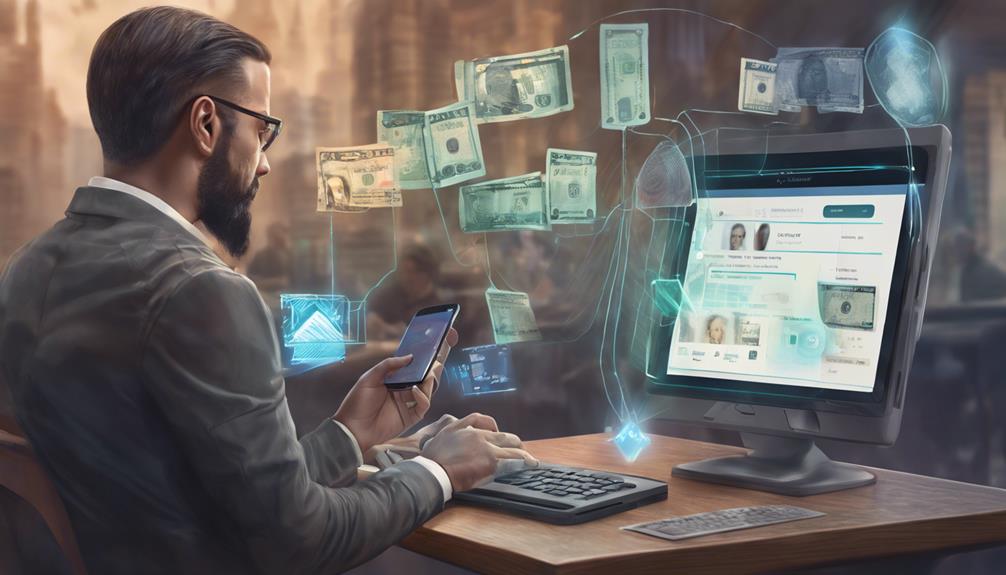
In the domain of online banking security, one pivotal aspect that greatly enhances account protection is the implementation of multi-factor authentication. This method adds an extra layer of security by requiring users to provide a second form of verification, such as a one-time code or biometric data, in addition to their password. By incorporating multi-factor authentication, the risk of unauthorized access to your account is significantly reduced, even if your password is compromised. Many financial institutions offer this option to their customers, as it can greatly decrease the likelihood of hackers gaining access to sensitive financial information.
| Multi-Factor Authentication | ||
|---|---|---|
| Extra Layer of Security | One-Time Code | Biometric Data |
| Reduces Unauthorized Access | Enhances Account Security | Decreases Hacker Risk |
Regular Security Updates Necessity
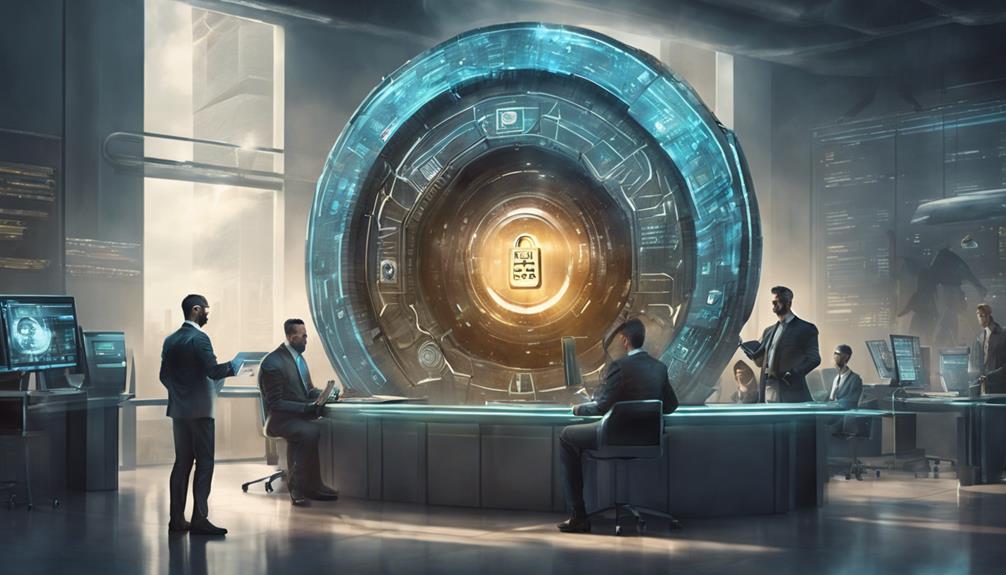
Frequent security updates are essential in the fight against cyber threats targeting bank accounts. By regularly updating software and systems, individuals can adopt cybersecurity best practices that reduce the risk of unauthorized access.
These updates serve as risk reduction strategies, strengthening the defense mechanisms against potential hacking attempts.
Importance of Updates
Consistent software updates are essential to maintaining the security of your financial information stored in the bank and shielding it from potential hacker attacks. Regular updates play a vital role in protecting your money by addressing security vulnerabilities that hackers could exploit to gain unauthorized access to your bank accounts. These updates often include security patches that enhance the overall protection against cyber threats targeting your funds. By keeping your software up to date, you greatly reduce the risk of falling victim to phishing attacks and fraud, ensuring the safety of your finances within the banking system.
| Importance of Updates | |
|---|---|
| Enhances Security | Shields Against Attacks |
| Reduces Phishing Risks | Protects Financial Data |
Updating software is not merely a recommendation but a necessity in the digital age to safeguard your assets within the banking sector.
Cybersecurity Best Practices
Maintaining your digital systems and banking applications updated with the latest security patches is essential for safeguarding your financial assets from potential cyber threats.
Cybersecurity experts emphasize the critical role of regular software updates in enhancing the security of online banking transactions and protecting sensitive personal information.
Hackers often exploit vulnerabilities in outdated software to gain unauthorized access to accounts, underscoring the significance of staying current with security measures.
By promptly applying software updates, you can reduce the risk of falling victim to cyberattacks and uphold the safety of your money in the bank.
Timely updates not only strengthen the security of your devices but also help in fortifying the defenses of banking apps, making it harder for cybercriminals to breach your accounts.
Therefore, giving due importance to software updates as part of your cybersecurity best practices is crucial in maintaining a secure online banking environment and safeguarding your financial information.
Risk Reduction Strategies
To mitigate the risk of hackers targeting your bank accounts, it is essential to prioritize the timely implementation of security updates for your digital systems and banking applications.
Regular software updates are vital in maintaining a secure online banking experience. Hackers often take advantage of outdated software and systems, making it important to stay proactive with software updates to safeguard your money.
By regularly installing software patches and updates, you can close security vulnerabilities that hackers may exploit to access your funds. Neglecting to update your software regularly greatly increases the likelihood of falling victim to cyberattacks, potentially resulting in financial losses.
Additionally, implementing two-factor authentication and other account security measures can further enhance the protection of your online banking activities.
Stay vigilant, prioritize security updates, and take necessary steps to secure your accounts from unauthorized access. Remember, prevention through timely updates is key to reducing the risk of cyber threats to your financial assets.
Staying Vigilant and Monitoring Accounts
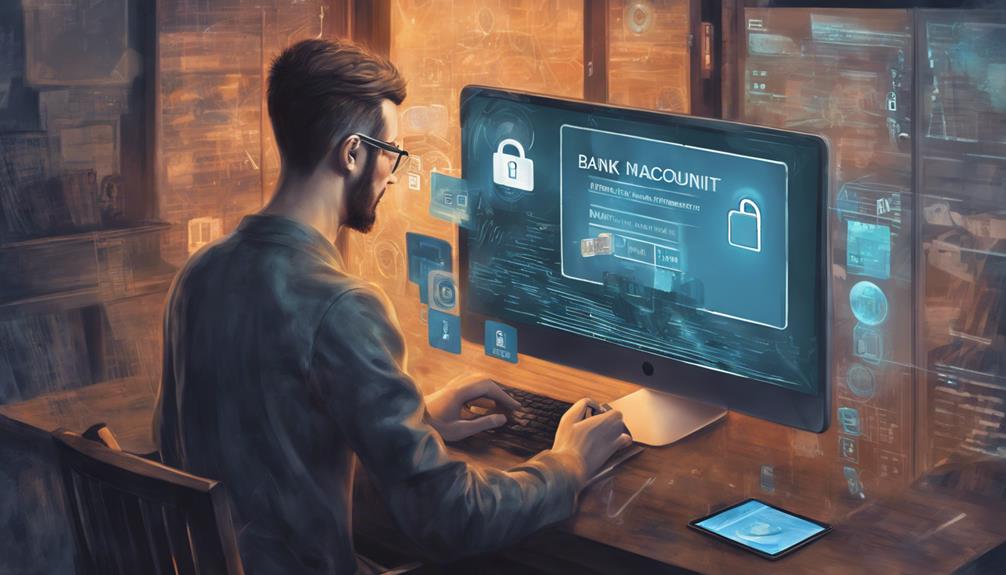
Regularly monitoring your bank accounts for any suspicious activity is essential in safeguarding your finances from potential hacking attempts. With the convenience of online banking comes the responsibility to stay vigilant and actively monitor account activity.
By regularly reviewing your transactions and keeping an eye out for any signs of suspicious activity, such as unfamiliar purchases or unexpected account changes, you can detect potential hacks early on. Setting up alerts with your bank to receive notifications for any unusual account activity can further enhance your ability to identify and respond to potential security breaches promptly.
It is vital to report any unauthorized transactions immediately to your financial institution. Acting swiftly can help mitigate potential losses resulting from hacking attempts. Utilizing the security features provided by your bank, such as biometric authentication and secure login options, adds an extra layer of protection against hackers and safeguards your financial information.
Stay proactive, monitor your accounts diligently, and report any concerns promptly to safeguard the security of your funds.
Best Practices for Online Security
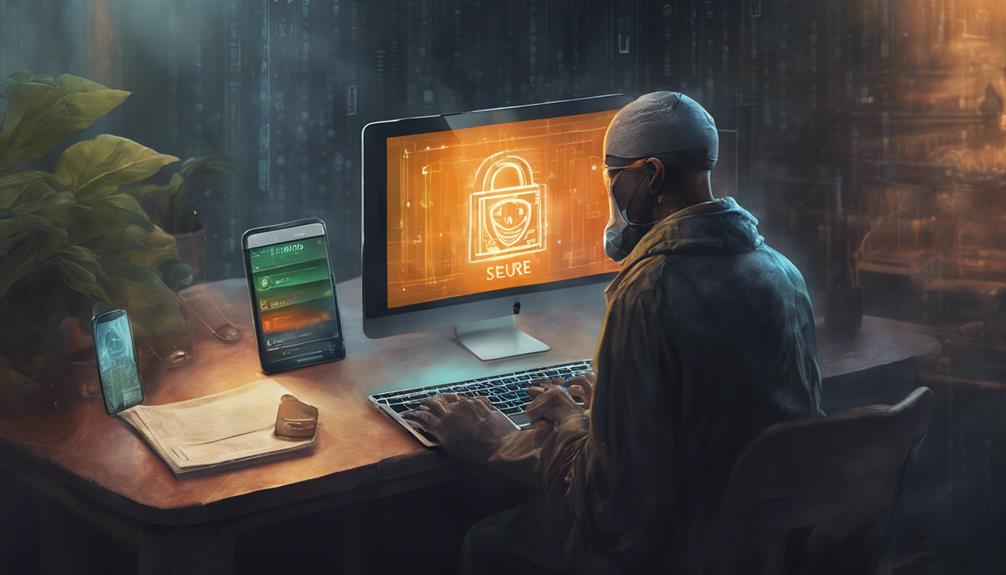
By implementing robust security measures and following best practices, you can enhance the protection of your online bank accounts from potential cyber threats. One important step is to use unique and strong passwords for your online banking accounts.
Avoiding public Wi-Fi networks when conducting financial transactions is also essential as these networks can be vulnerable to hackers. Additionally, enabling two-factor authentication adds an extra layer of security by requiring both a password and a verification code to access your account.
Online banks often employ encryption, firewalls, and fraud monitoring systems to safeguard account information. Regularly monitoring your account activity for any suspicious transactions can help detect unauthorized access promptly.
It is important to be aware of common online banking security threats like phishing scams, malware attacks, and DDoS attacks. Remember to refrain from sharing personal information online and contact your bank immediately if you notice any irregularities in your account.
Following these best practices can greatly reduce the risk of unauthorized access to your funds.
Enhancing Safety of Your Funds

Enhancing the safety of your funds in the bank requires implementing robust security measures such as two-factor authentication and regular monitoring for any suspicious activity.
By utilizing password managers and staying vigilant against phishing attempts, you can safeguard your financial information from potential hackers.
It is essential to proactively stay informed about cybersecurity threats and promptly report any unauthorized transactions to your bank to guarantee the protection of your funds.
Secure Online Banking
Online banks employ advanced security measures such as encryption, firewalls, and multifactor authentication to safeguard your funds from hackers. When accessing your online bank account, these security protocols help prevent unauthorized access and protect your sensitive information.
In addition to these measures, automatic sign-out features and time-out settings add an extra layer of protection to make sure that your online banking sessions are secure.
To further enhance the security of your funds, it is vital to stay vigilant against phishing scams, malware attacks, and DDoS attacks that cybercriminals may use to compromise your online bank account. Regularly reviewing your account activity for any suspicious transactions is important.
If you notice any unauthorized or suspicious transactions, contacting your bank immediately can help prevent potential financial losses.
In a digital landscape where online crimes have resulted in over $10.3 billion in losses, adopting secure online banking practices is essential to safeguarding your money from hackers and cyber threats.
Two-Factor Authentication
Two-factor authentication greatly enhances the security of your bank account by requiring a password and a second form of verification. This additional step notably reduces the risk of unauthorized access, providing an extra layer of protection for your funds. Here are three key points to ponder:
- Two-factor authentication adds an extra level of security by requiring both something you know (like a password) and something you have (such as a code sent to your phone).
- Using authenticator apps can generate secure codes for two-factor authentication, making it harder for hackers to breach your account.
- Many banks and financial institutions offer two-factor authentication as a standard security feature to safeguard customer funds, emphasizing the importance of this security measure in online banking.
Activating two-factor authentication for your bank account is a proactive step to enhance security, prevent unauthorized access, and keep your money safe from potential hackers.
Frequently Asked Questions
Where Is the Safest Place to Keep Money From Hackers?
The safest place to keep money from hackers is in secure financial institutions like banks. They employ robust security measures such as encryption, firewalls, and fraud monitoring to protect customer funds from cyber threats.
Can a Hacker Take Money From Your Bank Account?
A hacker can potentially access and steal money from your bank account through various cyber attacks and fraud schemes. Employing robust security measures like strong passwords and two-factor authentication can help safeguard your finances from unauthorized access.
What Happens to My Money if My Bank Gets Hacked?
In the event of a bank hack, your money may be exposed to unauthorized withdrawals or fraudulent transactions. While banks employ security measures, losses can occur. Monitoring accounts, reporting suspicious activity, and following security protocols are essential for protection.
What Bank Is the Most Secure From Hackers?
When considering bank security against hackers, institutions like JPMorgan Chase, Bank of America, Wells Fargo, Citibank, Ally Bank, and Discover Bank are recognized for their robust cybersecurity measures, advanced encryption, multifactor authentication, and proactive security features.
Conclusion
To sum up, while banks implement various security measures to protect your money from hackers, it is important to stay vigilant and proactively monitor your accounts.
By following best practices for online security, such as using strong passwords and enabling multi-factor authentication, you can enhance the safety of your funds.
Remember, in the ever-evolving landscape of cybersecurity, it is essential to ask yourself: are you taking the necessary steps to safeguard your financial assets?
